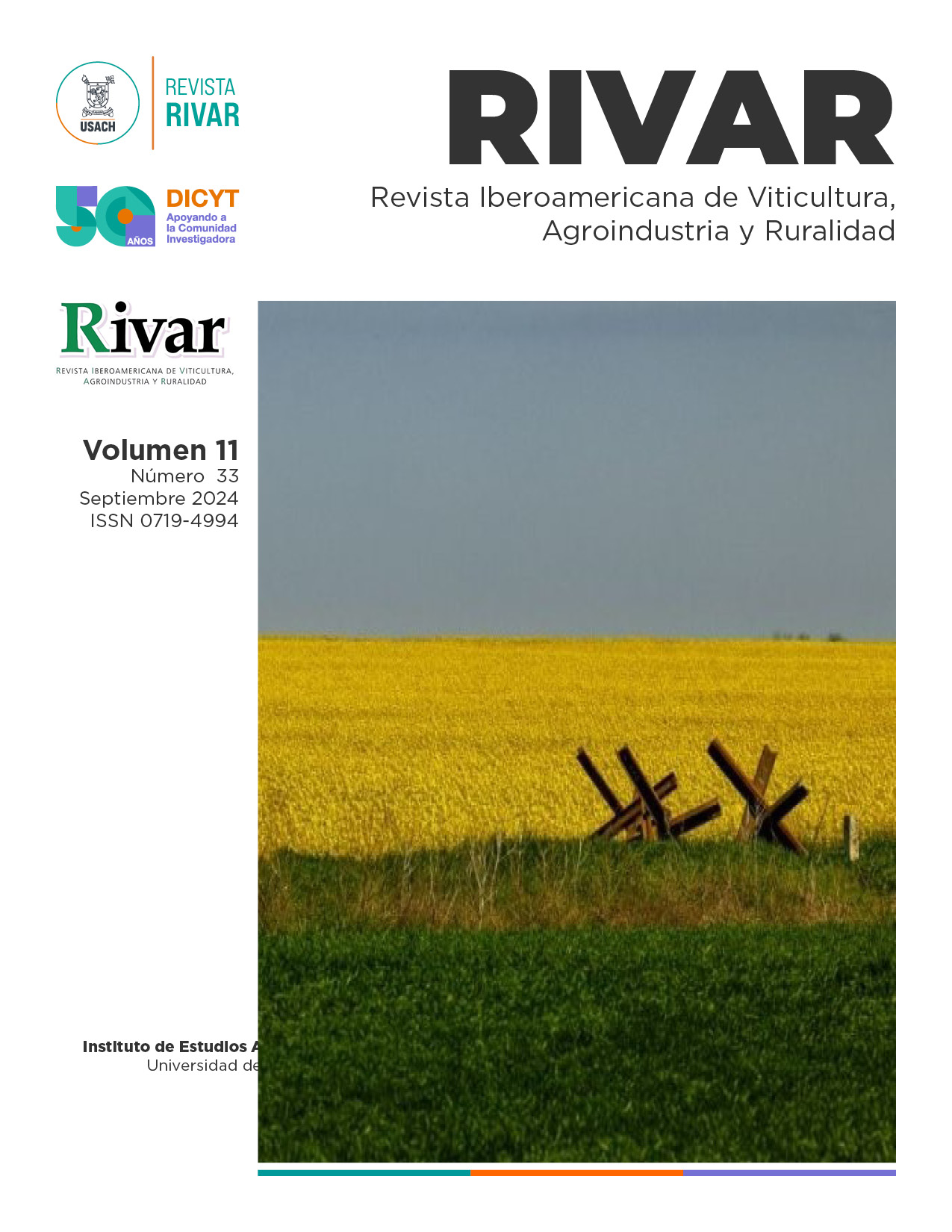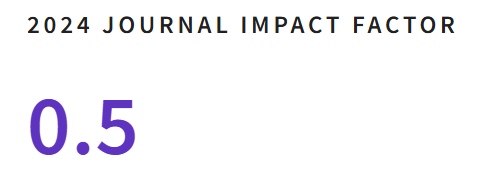Principales resultados de la transición a la agricultura orgánica en la República de Kazajistán
DOI:
https://doi.org/10.35588/rivar.v11i33.6364Palabras clave:
agricultural sector, innovation, state management, sustainable development, farmingResumen
En la realidad moderna, los países que se especializan en la venta de productos agrícolas en el extranjero se dividen condicionalmente en dos tipos: aquellos que se dedican principalmente al cultivo de productos orgánicos y aquellos que utilizan activamente fertilizantes y pesticidas sintéticos. La República de Kazajistán es uno de los ejemplos de estados que están adoptando los principios de la agricultura orgánica. Por lo tanto, sigue siendo pertinente considerar los principales resultados de Kazajistán en el contexto de la transición hacia tales principios de funcionamiento. El objetivo es mostrar lo que la República de Kazajistán ha logrado en términos de transición a la agricultura orgánica y cuáles tendencias se observan actualmente en la industria. El trabajo demostró que el país ha alcanzado ciertos indicadores en cuanto a la transición a la agricultura orgánica. En particular, se sentaron las bases para el marco legislativo, que en principio creó la oportunidad de desarrollar este negocio. Sin embargo, sigue siendo relevante un número significativo de problemas que impiden el logro de los objetivos previstos en la industria. El principal es la falta de producción nacional en el mercado interno del país debido al complejo proceso de certificación.
Descargas
Referencias
Beloev, H.I., Stoyanov, K.E., Dimitrov, P.D., Kravchuk, V., Kangalov, P.G., and Marinov, S.Z. (November 12-14, 2020). Study of the Operational Efficiency Indicators of Soil - Protecting Machine - Tractor Aggregates Used for Vertical Mulching by Importing Organic Matter in the Soil. In 2020 7th International Conference on Energy Efficiency and Agricultural Engineering, EE and AE 2020 - Proceedings, 9279006. Institute of Electrical and Electronics Engineers. Ruse, Bulgaria.
Crowder, D.W. and Reganold, J.P. (2015). Financial Competitiveness of Organic Agriculture on a Global Scale. Proceedings of the National Academy of Sciences of the United States of America, 112(24), 7611-7616. https://doi.org/10.1073/pnas.1423674112
Das, S., Chatterjee, A., and Pal, T.K. (2020). Organic Farming in India: A Vision Towards a Healthy Nation. Food Quality and Safety, 4(2), 69-76. https://doi.org/10.1093/fqsafe/fyaa018
Durrer, A., Gumiere, T., Zagatto, M.R.G., Feiler, H.P., Silva, A.M.M., Longaresi, R.H., Homma, S.K., and Cardoso, E.J.B.N. (2021). Organic Farming Practices Change the Soil Bacteria Community, Improving Soil Quality and Maize Crop Yields. PeerJ, 9, e11985. https://doi.org/10.7717/peerj.11985
Ekoconnect (2021). Report on the Situation of Development of Organic Agriculture and Food Industry in Kazakhstan. Ekoconnect. http://www.ekoconnect.org/tl_files/eko/p/Projekte/MOE-Laenderberichte/Stranovoj-otchet-po-organicheskomu-selskomu-xozjajstvu-Kazaxstana-EkoConnect-2021.pdf
FAO (2015). On the Approval of the Rules for Maintaining the Register of Producers of Organic Products. FAO. https://faolex.fao.org/docs/pdf/kaz161070R.pdf
Grigoruk, V.V. and Ayulov, A.M. (2019). Ecological and Economic Conditions in Kazakhstan for Growing Crops Using Organic Technologies. Human Science: Studies in the Humanities, 4(38), 223-229.
Home, R., Indermuehle, A., Tschanz, A., Ries, E., and Stolze, M. (2019). Factors in the Decision by Swiss Farmers to Convert to Organic Farming. Renewable Agriculture and Food Systems, 34(6), 571-581. https://doi.org/10.1017/S1742170518000121
Karabassov, R., Nurmaganbetov, K., Aidynov, Z., Orynbekova, G., and Khapova, A. (2022). The Main Areas of Development of Organic Agriculture in the Republic of Kazakhstan. Scientific Horizons, 25(9), 105-116. https://doi.org/10.48077/scihor.25(9).2022.105-116
Meemken, E.V. and Qaim, M. (2018). Organic Agriculture, Food Security, and the Environment. Annual Review of Resource Economics, 10, 39-63. https://doi.org/10.1146/annurev-resource-100517-023252
Nasiyev, B., Bushnev, A., Zhanatalapov, N., Bekkaliyev, A., Zhylkybay, A., Vassilina, T., Shibaikin, V., and Tuktarov, R. (2022). Initiation of Safflower Sowings in the organic farming system of Western Kazakhstan. Oilseeds & Fats Crops and Lipids, 29, 34-46.
Reddy, A.A., Melts, I., Mohan, G., Rani, C.R., Pawar, V., Singh, V., Choube, Y.M., Vashishtha, T., Suresh, A., and Bhattarai, M. (2022). Economic Impact of Organic Agriculture: Evidence from a Pan-India Survey. Sustainability, 14(22), 15057. https://doi.org/10.3390/su142215057
Republic of Kazakhstan (2015). On the Production of Organic Products. Law of the Republic of Kazakhstan. https://online.zakon.kz/Document/?doc_id=37002307&pos=3;-108#pos=3;-108
____. (2017a). Organic Products. National Mark of Conformity for Organic Products. Technical Requirements and Procedure for Labelling Organic Products. Standard of the Republic of Kazakhstan 3109-2017. Republic of Kazakhstan. https://online.zakon.kz/Document/?doc_id=32713286&pos=3;-106#pos=3;-106
____. (2017b). Conformity Assessment. Requirements for Bodies to Confirm the Conformity of the Production of Organic Products and Organic Products. Standard of the Republic of Kazakhstan 3110-2017. Republic of Kazakhstan. https://online.zakon.kz/Document/?doc_id=37876843
____. (2017c). Organic Products. Requirements for the Production Process. Standard of the Republic of Kazakhstan 3111-2017. Republic of Kazakhstan. https://online.zakon.kz/Document/?doc_id=34797135
Samenbetova, D.S. and Patlasov, O.Y. (2022). Model of State Support for Organic Farming of Kazakhstan in the Context of Creation of International Regulatory Framework for the Industry. BIO Web of Conferences, 42, 06004. https://doi.org/10.1051/bioconf/20224206004
Shahini, E., Shehu, D., Kovalenko, O., and Nikonchuk, N. (2023). Comparative Analysis of the Main Economic and Biological Parameters of Maize Hybrids that Determine their Productivity. Scientific Horizons, 26(4), 86-96. https://doi.org/10.48077/scihor4.2023.86
Smith, O.M. et al. (2019). Organic Farming Provides Reliable Environmental Benefits but Increases Variability in Crop Yields: A Global Meta-analysis. Frontiers in Sustainable Food Systems, 3. https://doi.org/10.3389/fsufs.2019.00082
Znaor, D., Pretty, J., Morrison, J., and Todorovic, S.K. (2005). Environmental and Macroeconomic Impact Assessment of Different Development Scenarios to Organic and Low-input Farming in Croatia. University of Essex.









